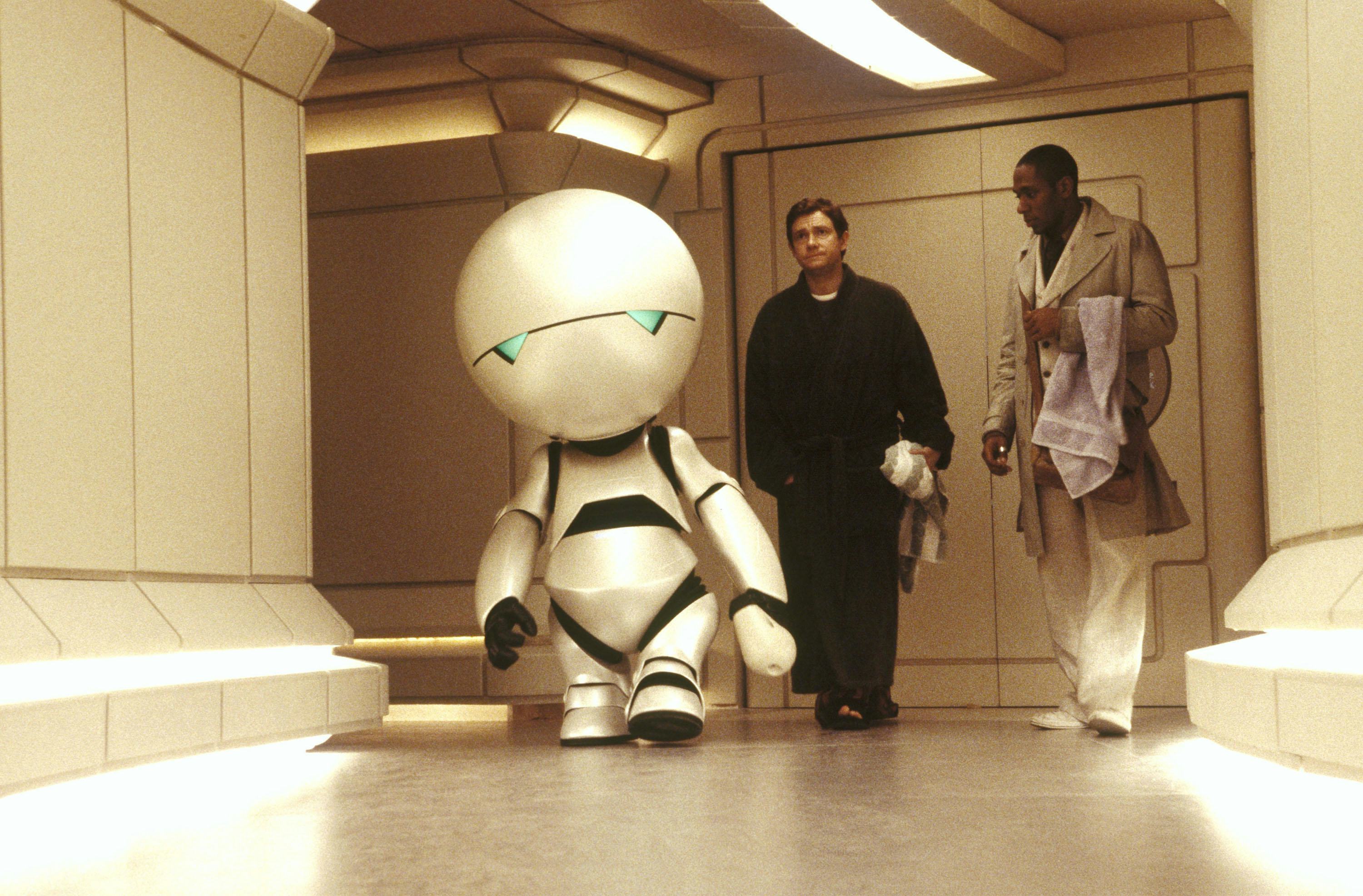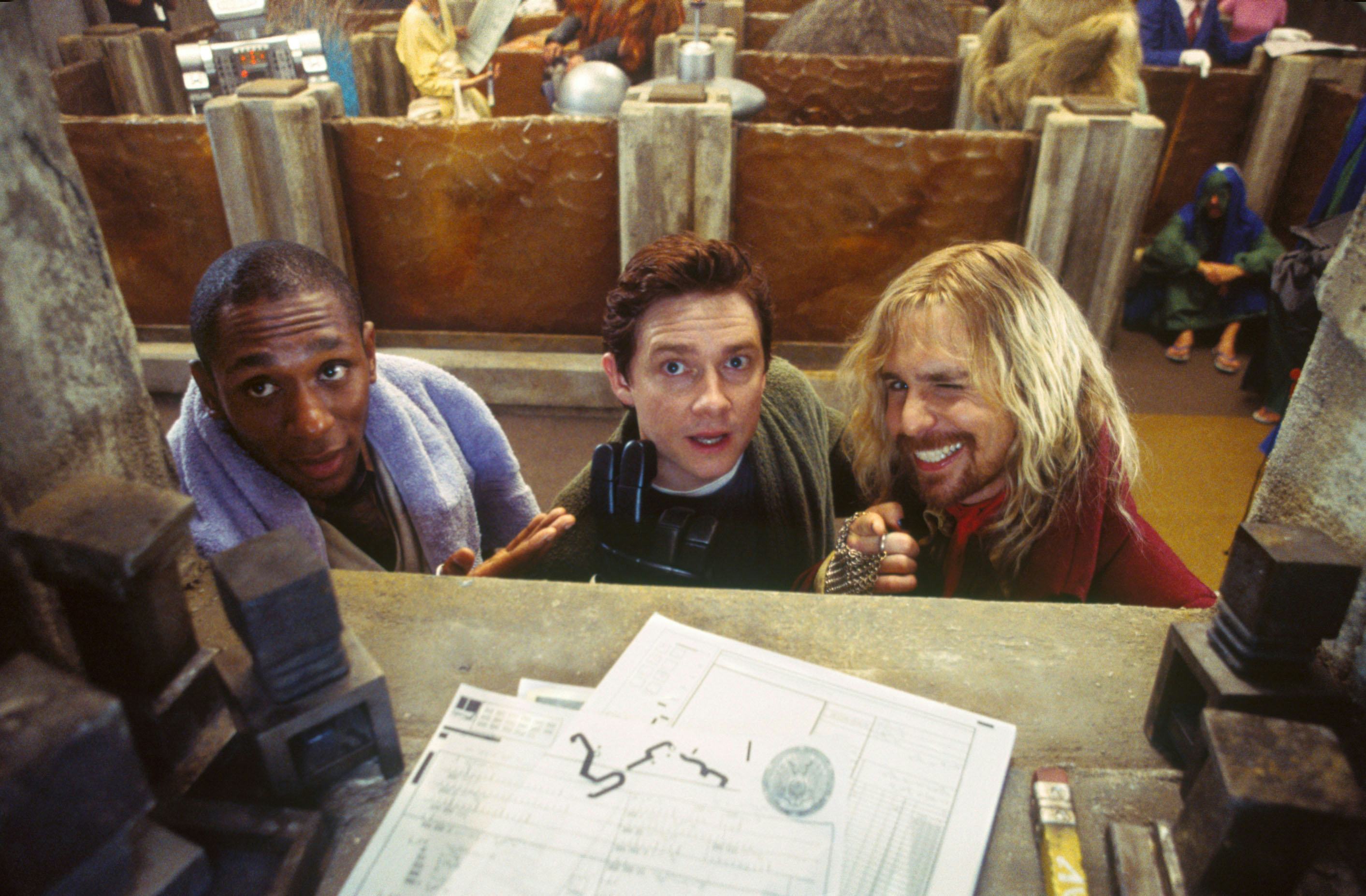
The Hitchhiker’s Guide to the Galaxy has been repackaged in many forms. Writer Douglas Adams began the science fiction franchise as a radio sitcom, which then became a series of novels, a 1980s British TV series and even a text-based adventure game. While The Hitchhiker's Guide to the Galaxy and successive novels received critical acclaim and a large fan base, 20 years ago one such iteration, Garth Jennings’ The Hitchhiker’s Guide to the Galaxy, was subjected to a panning it didn’t deserve.
Like the book, the radio series and TV show, The Hitchhiker’s Guide to the Galaxy movie begins in much the same way. Arthur Dent (Martin Freeman) is trying to prevent the demolition of his house, while his friend Ford Prefect (Mos Def) is trying to save himself and Arthur from the impending demolition of Earth itself. As this already paradoxically absurd and mundane adventure builds steam, collecting along their intergalactic hitchhiking journey the president of the galaxy Zaphod Beeblebrox (Sam Rockwell) and Arthur’s crush Trillian (Zooey Deschanel), Arthur finds himself ripped away from his morning cup of tea into the infinite possibilities of the universe, all while still wearing his pajamas.
Everyone loves to point out what went wrong with the 2005 adaptation of Douglas Adams’ Hitchhiker's Guide to the Galaxy, but they forget what went right. Following in the same vein as the novel, as the story progresses it is intercepted with narration from the “Hitchhiker’s Guide to the Galaxy,” a tour guide to the universe (voiced by Stephen Fry). A mixture of sarcastic and casually informative suggestions, the guide fits somewhere between Vice’s knowing tone and that of Lonely Planet. The decision to pair these explanatory interjections with the no-fuss infographics (the kinds still favored by graphic design teams today), demonstrates the film's mockery of the guide that forms the backbone of film’s worldbuilding — it at itself and the species it details.
With no promise of a successor, the movie endeavours to fill its runtime with as much of Douglas Adams’ unique intergalactic world as possible. One unique feature of Adams’ franchise is the “improbability drive,” a feature of the Heart of Gold spaceship which allows the spaceship to make impossible jumps through space, with its passengers thrown into changes of their being, becoming flowers, furniture, and even for a moment stop-motion knitted puppets. Equally as inventive yet comparatively grim are the bumbling Vogons, an ugly and cruel species whose slow bureaucratic work is as clunky and awkward as their grotesque physical features. It’s the movie’s dedication to creating the worst office block one can imagine— complete with sludgy dark interiors courtesy of set director Kate Beckley — that point to the film’s dedication to bringing Douglas Adams expansive universe to life.

The Hitchhiker’s Guide to the Galaxy is a film filled with British cliches, personified through depressive robot Marvin (voiced by Alan Rickman), the red-tape fanatical Vogons and the stammering reluctant Arthur. The movie offers up a sci-fi riff on classic out-of-touch English bureaucracy coupled with the anti-intellectualism — quite literally depicted by the metal slats that spring out of the ground on the Vogon planet whenever someone dares proffer an idea — along with the buffoonery of American politicking. It paints a political portrait as damningly true and ineffective now as it was in 2005.
The Hitchhiker's Guide to the Galaxy fits into a particularly British form of sci-fi comedy, which consciously evokes national cliches and errs on the side of English twee. But in its literal otherworldly depictions, it shares much with Doctor Who in political point of view and mockery of the world order. The movie’s commitment to humor over atmosphere may put it at odds with today's moody science fiction worlds such as Dune, but The Hitchhiker’s Guide to the Galaxy holds up today as a blueprint for the slapstick, pantomiming, politicized humor apparent in the likes of Bong Joon-ho’s Mickey 17. All in all, it’s a film that may not exist even on the same plane as other adaptations of Douglas Adams original idea, but deserves revisiting for its astute and witty analysis of global, and galactic, affairs of state.







